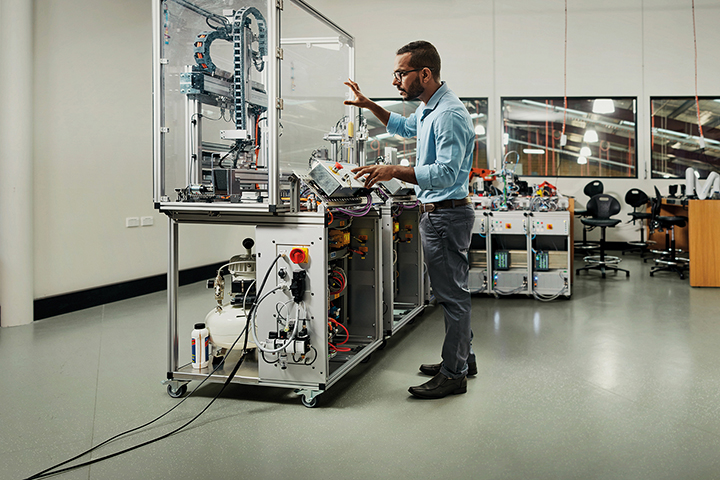- Go to homepage
- Course areas
- Engineering
- Certificate II in Engineering

OverviewAbout this course
Kick-start your engineering career or begin a strong pathway for further study. You’ll gain a broad understanding of underpinning engineering principles, explore mechanical engineering, fabrication and more, and graduate ready for endless employment opportunities.
OutcomesWhat you'll gain
Learning outcomes
Through a mixture of theory and practical course work, learn to:
Apply foundational engineering principles
Put planning skills into action
Work with quality procedures and systems
Follow work, health and safety regulations and codes of practice
Course outcomes
Gain practical experience and develop specialist skills that give you an advantage in the job market.
Experience using manufactured or machined components that are commonly used in manufacturing industries
Strong study pathways to continue your training and enhance your career opportunities
SuitabilityIs this course right for you?
Entry requirements
Some courses require evidence of previous experience or study before you can enrol
There are no entry requirements for this qualification. You can enrol today.
This course is offered as a traineeship. Enquire today to check the eligibility requirements.
Completion requirements
During your study you’ll need to provide your teacher with the following evidence:
Entry recommendations
To be prepared for this course, we recommend that you have:
Completed Year 10 of high school
A good understanding of math and English
Current employment in the engineering and manufacturing industry
TAFE NSW is committed to meeting the learning needs of every community. Meeting these needs can mean there are additional entry requirements at different campus locations. Check your preferred location for further requirements. If you need help preparing for study, contact us to find out how we can support you.
PathwaysFuture career and study options
Career pathways
Our graduates go onto roles like:
Metal Engineering Process Worker
Metal Engineering Process Workers perform routine tasks in manufacturing metal products.
Full-time share Full-time workers usually work 35 hours or more a week (in all their jobs combined).
89%
Employment size Employment size is the number of workers who do this as their main job.
2,700 workers
Average age This is the average age of all workers in this job.
42 years
Weekly pay Median earnings are shown for full-time, non-managerial employees paid at the adult rate, before tax or any amounts that are salary sacrificed. These figures are a guide to earnings only and should not be used to determine a wage rate.
$1,050
Average full-time The average full-time hours that people in this role work each week.
42 hours
Skill level rating Skill level ratings are based on the range and complexity of job roles. In general, the higher the skill level, the more formal education and training, previous experience or on-the-job training needed to be good at the job.
Entry level
Gender share
6% female
Future growth The Department of Employment, Skills, Small and Family Business estimates the likely change in number of workers in this role, or industry, over the next 5 years. Future growth is the likely percentage change compared to all other job roles.
Moderate Growth
Other jobs include: jewellery maker, engineering factory worker, production worker and warehouse operator (metal and engineering).
Study pathways
Take your study further with other courses offered at TAFE NSW:
Previous study0 Courses
Begin here to gain experience and confidence in this study area.
The Certificate II in Engineering does not have any pre-requisite courses.
Further study0 Courses
Advance your skills to take your career to the next level
The Certificate II in Engineering does not have any post-graduate courses.
Related study0 Courses
Strengthen your expertise and gain specialist skills to expand your employability.
The Certificate II in Engineering does not have any related courses.
Your experience counts
At TAFE NSW, we recognise your previous study and work experience. You can apply for recognition of prior learning or a credit transfer with any of our courses. If you're successful you'll get your qualification faster.
UnitsUnits taught in this course
Courses are made up of a combination of both core and specialty units. In the Certificate II in Engineering qualification, you’ll need to successfully complete 20 units of competency, including 5 core and 15 speciality units.
Please note, not all specialty units are offered at every TAFE NSW location. It is highly recommended that you check with your preferred campus for information about the specialty units offered at that location.
Core units are central to the job outcomes of a particular industry or occupation. These are the units industry has agreed are essential to be capable and qualified at a particular study level.
Apply quality systemsMEM15002A
Apply quality proceduresMEM15024A
Plan to undertake a routine taskMEM14004A
Work with others in a manufacturing, engineering or related environmentMEM16007A
TAFE NSW servicesFacilities and support
TAFE NSW provides support services across all campus locations and online. Whatever your needs or circumstances, we have the people, resources, counselling and facilities to support you in focusing on your studies.
TAFE NSW Disability Support Service
TAFE NSW Language, Literacy and Numeracy (LLN) support
TAFE NSW Aboriginal Support; Learner support (ABE)
TAFE NSW Careers, Counselling and Pathways Service
TAFE NSW Libraries
Scholarship programs – be supported as you explore your talents and fulfil your potential
Read&Write literacy and study support software is available free for all TAFE NSW students to use while studying on campus and at home
LinkedIn Learning – an online resource which offers innovative courses and tutorials to improve your personal and professional skills
Student associations – get social with our student community